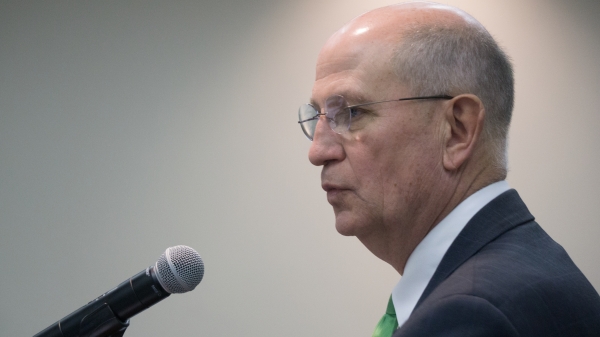Lawmakers, formerly incarcerated individuals and advocacy leaders came together at the Alabama Statehouse this week for the Joint Prison Oversight Committee’s annual hearing, confronting issues of violence, overcrowding and inadequate rehabilitation across the state’s prison system.
Among the most powerful voices was Rachel Elledge, a woman who was incarcerated at Julia Tutwiler Prison for Women. She described conditions inside Alabama’s only women’s prison as deplorable and dangerous.
“I was sentenced to an environment just as violent as the one I came from,” said Elledge. “Except this time, it was run by the Alabama Department of Corrections.”
She testified that because her sentence was relatively short, she didn’t qualify for programs intended to help women recover from addiction or prepare for reentry. Waitlists for those programs were over a year long. She said the only reason she was able to reenter society successfully was because she was paroled to the Lovelady Center in Birmingham, a nonprofit transitional program.
“An officer once told me, ‘I put two of my daughters through college off what I make from selling drugs in here,’” said Elledge.
Her testimony struck legislators, who acknowledged that while the state is investing in a new men’s prison, the oldest and most dilapidated facility in Alabama is Tutwiler.
“I don’t want to people to forget the fact that while there are plans to build a new men’s facility and another to follow, the oldest, the worst, is where we house women. I just think it sends a horrible message that we’re allowing women to live in squalor, in a hellhole, while we focus on building another facility for men,” said Representative Chris England, D-Tuscaloosa.
Faith leaders emphasized that true corrections should center around structure, redemption and opportunity. Bobby White, a longtime prison minister who works in Alabama facilities, spoke on behalf of a group of pastors committed to supporting individuals who are incarcerated.
“Incentive promotes good behavior, and the more structure and opportunity you provide, the more attentive and hopeful people become,” said White.
The hearing also addressed proposed changes to parole guidelines that could double the time between parole reviews for individuals serving life sentences.
Laura Click, who teaches life skills to formerly incarcerated individuals, warned the committee that extending parole setoffs from five to ten years would destroy what little incentive remains for rehabilitation.
“Hope for release is the strongest driver of change we have. Stretching parole reviews to ten years doesn’t spare families from pain, it silences them for a decade,” said Click.
Click also pointed out that the current parole scoring system only considers disciplinary actions from the past 12 months, meaning someone with a violent infraction 13 months ago may appear identical on paper to someone with a spotless 30-year record.
“That’s nuts, There’s a better way to measure rehabilitation,” said Click.
Carla Crowder of Alabama Appleseed expanded on the policy concerns, raising specific issues with how the draft parole guidelines penalize incarcerated individuals for failing to secure jobs or housing before release.
“There’s a section that assigns people negative points if they don’t have a home or job plan,” said Crowder. “But how are they supposed to secure those things from inside the prison, especially when the Department of Corrections lacks the staff and resources to help?”
Crowder noted that the Alabama Reentry Task Force recently reported a lack of infrastructure to connect incarcerated people with employment or transitional housing.
She suggested rather than awarding negative points for lacking a plan, give positive credit to those who do manage to find housing or employment.
“So essentially, we’re punishing people for not doing something the system gives them no real way to do. That would shift the burden in a more humane, realistic direction,” said Crowder.
Tim Mathis, whose son Chase was killed at Elmore Correctional Facility just before he was scheduled to be released, delivered one of the most emotional testimonies.
“You wouldn’t expect your loved one to go into a prison with easier access to drugs than the street, but that’s what’s happening,” said Mathis. “And we’re building a billion-and-a-half-dollar prison we might not even be able to staff.”
Yolanda Williams, a 20-year U.S. Army veteran, testified on behalf of her husband, who is incarcerated in conditions she described as “inhumane.”
“If those were dogs living in there, someone would be arrested for cruelty,” Williams said. “But these are human beings. We are killing them slowly. As a veteran, I’ve defended this country. And I refuse to stay silent while my husband is treated like less than a person.”
England stressed that while the legislature does not control the day-to-day operations of the prison system, the stories shared during these hearings have already resulted in concrete changes like new laws, new oversight mechanisms and shifts in leadership.
“We owe it to victims to ensure justice,” he said. “But we also owe it to the incarcerated and their families to ensure basic care and human dignity.”

















































